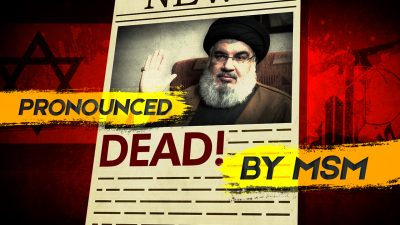Video: Nasrallah Pronounced Dead by MSM Amid Deepest Crisis in Lebanese History

All Global Research articles can be read in 51 languages by activating the “Translate Website” drop down menu on the top banner of our home page (Desktop version).
Visit and follow us on Instagram at @crg_globalresearch.
***
Lebanon is in crisis, both political and economic, and this promises to deteriorate further.
According to the World Bank, the country’s economic collapse is likely to rank among the world’s worst financial crises since the mid-19th century.
The complete meltdown of Lebanon’s economy during the past 18 months is widely blamed on corruption and mismanagement by the country’s hereditary political elite.
Israel as a “good neighbor” uses every chance it is given to attempt and deepen the crisis.
On June 1st, reports began flooding the media of Hezbollah secretary-general Hassan Nasrallah’s death.
The group is a staple of stability with its many helpful, albeit populist efforts. Of course, it is also one of Israel’s mortal enemies.
Nasrallah allegedly succumbed to COVID-19 complications, or was in a coma. These reports flooded the MSM, and especially Israeli outlets for longer than a day when they were debunked.
Lebanese Al Joumhouria newspaper reported that rumors of Nasrallah’s demise were hugely exaggerated. He simply has pneumonia and seasonal allergies.
Prior to the reports of his death, Hezbollah deputy secretary-general Naim Qassem said the secretary-general needed several days of rest and supervision, but instead wished to appear for his May 25th address, because missing it would cause people to worry.
The situation in Lebanon would have likely turned much worse if Hezbollah’s leader had passed. It would make it easier for Tel Aviv and its allies to pressure the country into submission.
During the 11-day hostilities in the Gaza Strip when Israel Defense Forces carried out an asymmetrical bombardment of Palestinian armed groups and civilians alike, several rockets were launched from Lebanese territory.
As such, the US deemed Hezbollah a threat to stability in Lebanon, mostly because it doesn’t support Tel Aviv’s policy.
The US has provided support for more than 15 years to the Lebanese Armed Forces (LAF), but the increasing influence of the terrorist-designated Hezbollah in Lebanese politics has strained the partnership.
The financial and political crisis in Lebanon has seen the value of the local currency plunge, wiping out people’s savings and salaries.
The crash has placed increasing pressure on members of the LAF. As such the chance to exert even more pressure and attempt to undermine Hezbollah’s influence shouldn’t be missed.
Starting from May 31st, political calls and meetings intensified in Lebanon in what was described as possibly “the last attempt” to salvage the process of forming a new government. There appears to be little progress, as a massive blackout looms in the country.
And help is only coming with extremely strict and heavy demands tied to it.
*
Note to readers: Please click the share buttons above or below. Follow us on Instagram, @crg_globalresearch. Forward this article to your email lists. Crosspost on your blog site, internet forums. etc.
SUPPORT SOUTHFRONT:
PayPal: [email protected], http://southfront.org/donate/ or via: https://www.patreon.com/southfront

